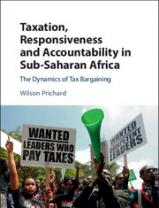It is increasingly argued that bargaining between citizens and governments over tax collection can provide a foundation for the development of responsive and accountable governance in developing countries. However, while intuitively attractive, surprisingly little research has captured the reality and complexity of this relationship in practice. This book provides the most complete treatment of the connections between taxation and accountability in developing countries, providing both new evidence and an invaluable starting point for future research. Drawing on cross-country econometric evidence and detailed case studies from Ghana, Kenya and Ethiopia, Wilson Prichard shows that reliance on taxation has, in fact, increased responsiveness and accountability by expanding the political power wielded by taxpayers. Critically, however, processes of tax bargaining have been highly varied, frequently long term and contextually contingent. Capturing this diversity provides novel insight into politics in developing countries and how tax reform can be designed to encourage broader governance gains.
Contents
1. Introduction: taxation, responsiveness and accountability in developing countries;
2. Linking taxation, responsiveness, and accountability: theoretical model and research strategy;
3. Taxation, responsiveness, and accountability in Ghana, 1981–2008;
4. Direct and indirect tax bargaining in Kenya, 1963–2008;
5. The quiet politics of taxation in Ethiopia, 1974–2008;
6. Understanding tax bargaining: complexity and contingency;
7. Looking forward: broader messages, policy lessons and directions for future research;
Appendix 1. List of key interviews.
Endorsements
“This book is a breakthrough in the study of the politics of taxation. It develops a powerful theory that links taxation to representation, a statistical analysis that supersedes (and overturns) many earlier studies, and three sharply-observed case studies that show the theory in action. Prichard’s analysis will dramatically improve our understanding of fiscal politics and should be widely read by both scholars and policymakers.” Professor Michael L. Ross, Department of Political Science, UCLA
“By far the most coherent, informed and rigorous treatment of the claim that taxation can stimulate better governance. This is the point of departure for anyone wanting to research the issue further.” Mick Moore, Professorial Fellow, Institute of Development Studies, University of Sussex
“Taxation and the question of how social contracts are formed (or not) is fast becoming one of the hot topics of debate in contemporary Africa. This book represents the best attempt yet to describe the new dynamics of tax bargaining on the continent and what they mean for the relationship between citizens and the state. The rich combination of econometric and case study analysis, combined with clear prose and important insights, mean that this volume should be read by everyone interested in the prospects for progressive economic and political change in Africa – and beyond.” Dr Nic Cheeseman, Associate Professor of African Politics at Oxford University and the Joint Editor of African Affairs
“The analysis and the approach of this book is essential reading for anyone interested in tax policy in developing countries and has much to offer to readers interested in the politics of tax policy (or, indeed, of public policy more generally) in any country.” Richard M. Bird, Professor Emeritus, University of Toronto
“In development circles it has become almost axiomatic that those who are taxed in return demand accountability from their governments, and thus that wide taxes bases lead to democratic advances. Prichard’s path-breaking book, using both econometrics and multiple comparative case studies, provides the first in-depth assessment of this proposition for Africa. The book is a ‘must read’ for those who shape development policies and for political economists alike.” David K. Leonard, Retired Dean of International and Area Studies and Professor of African Politics, University of California, Berkeley.
“This book gives us a detailed and comprehensive bridge between theory and practice. Its foundations are in careful case studies, its superstructure is a thoughtful and extended treatment of the tax bargaining or “fiscal contract” literature, and its roadway takes us to important implications for policymakers and aid donors. I recommend it energetically to students of comparative politics, tax specialists, and aid officials.” James Mahon, Professor, Williams College
To buy this title please visit the Cambridge University Press website

